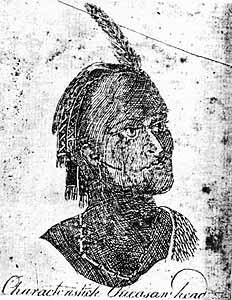Chickasaw
Chickasaw are a Native American people originally residing in what is now the Southeastern United States (modern-day Mississippi, Alabama, and Tennessee). Known for their rich history and vibrant culture, the Chickasaw were part of the Mississippian culture before the arrival of Europeans in North America. They are one of the members of the Five Civilized Tribes, a term coined by European Americans in reference to five Native American nations—the Chickasaw, Cherokee, Choctaw, Creek (Muscogee), and Seminole—that were considered "civilized" by Anglo-European settlers during the colonial and early federal period because they adopted many of the colonists' customs and had generally good relations with their neighbors.
History[edit | edit source]
The Chickasaw's early history is closely tied to that of the Mississippian culture, which was characterized by mound-building and complex societal structures. The Chickasaw are believed to have migrated to their historical homelands from the west, possibly from areas now in Mexico, as part of the Mississippian peoples' expansion across the continent.
During the 16th century, the Chickasaw first encountered Europeans in the form of Spanish explorers. These early encounters were generally marked by cooperation and trade, but also led to exposure to new diseases, against which the Chickasaw had no immunity, resulting in significant population declines.
In the 18th century, the Chickasaw became involved in the French and Indian War (1754–1763) and the American Revolutionary War (1775–1783), often siding with the British due to their trading relationships. The Chickasaw were known as fierce warriors and skilled diplomats, navigating the complex political landscape of European colonial powers and other Native American tribes.
Following the United States' independence, the Chickasaw continued to face pressure from American expansion. The Indian Removal Act of 1830 forced the Chickasaw, along with other members of the Five Civilized Tribes, to leave their ancestral lands and move to what is now Oklahoma in a journey that came to be known as the Trail of Tears. Despite these challenges, the Chickasaw established a new government and community in their new territory, maintaining their cultural identity and sovereignty.
Culture[edit | edit source]
The Chickasaw culture is deeply rooted in their history, spirituality, and connection to the land. Traditional Chickasaw society was matrilineal, with descent and inheritance passing through the mother's line. The Chickasaw were also known for their skills in warfare, hunting, and agriculture, cultivating crops such as corn, beans, and squash.
Ceremonial life played a significant role in Chickasaw society, with various ceremonies and rituals marking important events and transitions. The Green Corn Ceremony, for example, was a key annual event that celebrated the first corn harvest and included feasting, dancing, and religious observances.
Today, the Chickasaw Nation is a federally recognized tribe with a strong government and economic foundation. They are active in preserving their language, culture, and traditions through various educational and cultural programs, including the Chickasaw Cultural Center in Sulphur, Oklahoma.
Government[edit | edit source]
The Chickasaw Nation's government is based on a democratic system, with an elected governor and legislative body. The modern Chickasaw government continues to uphold the sovereignty and rights of the Chickasaw people, managing a range of services and programs aimed at promoting the welfare and development of its citizens.
Economic Development[edit | edit source]
The Chickasaw Nation has been proactive in economic development, operating a variety of businesses and enterprises that fund services and programs for its citizens. These include gaming and entertainment, hospitality, retail, and other industries. The economic success of the Chickasaw Nation serves as a model for indigenous economic development worldwide.
Navigation: Wellness - Encyclopedia - Health topics - Disease Index - Drugs - World Directory - Gray's Anatomy - Keto diet - Recipes
Search WikiMD
Ad.Tired of being Overweight? Try W8MD's physician weight loss program.
Semaglutide (Ozempic / Wegovy and Tirzepatide (Mounjaro) available.
Advertise on WikiMD
WikiMD is not a substitute for professional medical advice. See full disclaimer.
Credits:Most images are courtesy of Wikimedia commons, and templates Wikipedia, licensed under CC BY SA or similar.
Contributors: Prab R. Tumpati, MD





